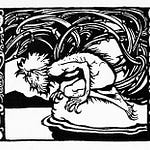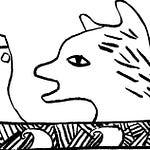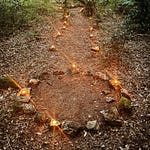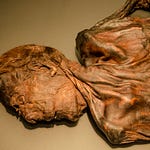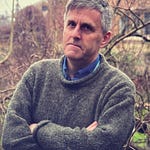WIND HAWK, the yard, Dartmoor, 2022.
BEASTS & VINES GATHERING OCT 28TH-30TH, DARTMOOR, UK.
Hello friends. First up, I’m excited to share that following many requests there will actually be a HOUSE OF BEASTS & VINES gathering Oct 28th - 30th, in Devon, England, fully residential. Hooray! All details, please click on the link. It would be splendid to clink a glass with you there. Places will go quickly.
Book your place: House of Beasts & Vines Gathering
For your ear is a grand and strange old fairy tale, The Earth Gnome. I enjoyed recording this for you. If you want to go deeper in it can be found with commentary in my book All Those Barbarians.
For your eye is a wee bit of writing below I put out briefly elsewhere, and above a long interview I recently gave with Mark Vernon. It’s a pretty candid jump into imagination, soul and major events in the last couple of years of my own life.
And before all that, poetry.
FOUR MODERN PERSIAN POEMS
If I wrap your blouse
around our wild almond tree
it will blossom
If I spread it over
the dried-up twigs of our grapevine
it will cast shade
If I entrust your blouse
to the wind
once again lights will shine in the foothills
of our mountains,
Aseh and Shirdavazeh
Parween Pazhwak, from Mother’s Shared Blouse
My hand
stretches towards the telephone
it comes back again
Like a child to whom they’ve said
the cakes on the table
are for guests
~Sara Ardehali, Difficult Evening
Once I was a tree
with black and white crows in my hair
with upside-down roots
the ground had set my body free,
my body, my roots,
roots that were the crow’s refuge
once I was everything
a dream filled with life in a year of famine.
~Fatemeh Shams, Roots
May the arm break that hasn’t clasped
Its love in its embrace
The eyes go blind that haven’t loved
To see their loved one’s face.
~Makhfi, Untitled
Read more of these wonderful poems here: The Mirror of My Heart, Translated by Dick Davies
LEARNING TO THINK IN DREAM
Find the wildest mountain you can
And ask it to be your grandfather,
Find the curviest river you can
And ask it to be your grandmother.
If blood spilled from me onto you, a significant amount of the drop – and I would hope it only a drop – would be Connemara in origin. Indeed, I was enspelled into a splendiferous thwonk of rapture when the taxi wheezed from mid Ireland up to Clifden to give the John Moriarty memorial lecture. The glass-glazed lakes, the bleached white cottages, dun cows and sheer swing of the conversation. I knew the yomp of it somehow.
Late that night after the reading, swelled with porter and a couple of Paddies, I sat on a park bench and opened my ears, nostrils and mouth to the pungent languages of the land and its associated dead. Little will-o’the-wisps they were, that glittered and danced and in they flew.
There’s more than one dimension in Connemara, and to Ireland. Along with its namesake Ériu, there’s Banba and Fódla her sisters. Three deities, three sisters who were all granted their name as the title of the island. Though we tend to remember Ériu, if we are to fall into poetic consciousness it is good to speak of Fódla, if we fall into land dreaming it is good to speak of Banba. So we want to be talking to three sisters in our chat, banter and occasional big speech.
And then there’s a fourth step, a journey into the 'Dinnseanches' of Ireland, the land-lore, magic and elusive memory energetics of the place. If that description is a little hard to follow it’s meant to be. It needs to breath, the edges of the tent still flapping a little.
Knowing Dinnseanches is part of how you learn to think in dream again.
I’ve spent much time loyal to that, though here, in the far west of Britain, not Ireland. I’m not saying they are the same country, but I recognise the necessity of contact if you want to deepen into a place. The vibrational dip. Sitting and sleeping and walking and listening in wild, holy crofts. Getting your back up against an oak tree and the turf under your arse. Thousands of hours of wandering and wondering, opening to the dimension of Fódla, the murmur of Banba. Being astray, getting adrift. Getting to grips with a little Irish in the jaw, sucking on the marrow of the language.
Sometimes a hill could be a white cow at a certain time of day, a river a sauntering woman.
My friend Manchán Magan knows all about this kind of thing. Things that saunter and twirl. He suggests that to an Irish way of looking, a field’s not just a field. It could be:
Tuar – a night field for cattle
Biorach – a field of marsh
Plasog – a field sheltered for foals to grow
Cluain – a meadow field between two woods
Caithairin – a field with a fairy place within it
We all swoon into such distinctions, the care, the poly not the mono. It’s how humans also desire to be known. That a lover knows your many temperaments and seasonal shifts. Tied up with close attention is usually something of a love affair. The farmer knows the field’s character because they love and depend on the character of that field. They coax it, get into the muck of it, even dream with it.
Manchán had his young mind blown as kid by his granny delivering a proverb to him, a seanfhocal – an ‘old word’. She said this:
Saol tri mhiol mhor saol Iomaire amhain, saol tri Iomaire saol an domhain.
‘Three times the life of a whale is the lifespan of a ridge, and three times the lifespan of a ridge is the lifespan of the world.’
The saying works like this: it used to be speculated that a whale could live a thousand years, a ridge for growing could make three thousand, and the world which the Irish understood would be nine thousand years old.
With nine thousand years being around the time that humans first started settling in Ireland there really is encoded knowledge in this saying, it’s a storehouse, as all good thinking and storytelling really is. Long before they were thought of as entertainers, storytellers were oral libraries, they kept history and magical lore tucked under the antler of their tongue.
Nine thousand years feels just about bearable for a human to comprehend. When we move into millions of years our legs buckle or we simply vacate the proposition. There was a time when we believed the sun revolved around us, not the other way round. There was a time when we looked up at the planets and called them influences, that they affected our mood, our tides, our plants and minerals. So in a wonderful way, when you looked up you were also looking inward, you saw aspects of yourself scattered over the night sky. Very beautiful. Reassuring and awesome. I’m not convinced that our current knowledge of nameless, endless universes has done much to steady us. Humble us possibly.
Onwards.
Manchán Magan's Thirty Two Words for Field







